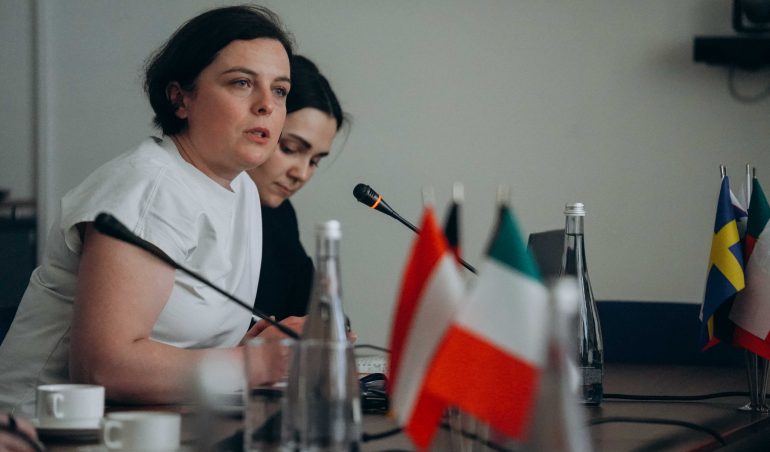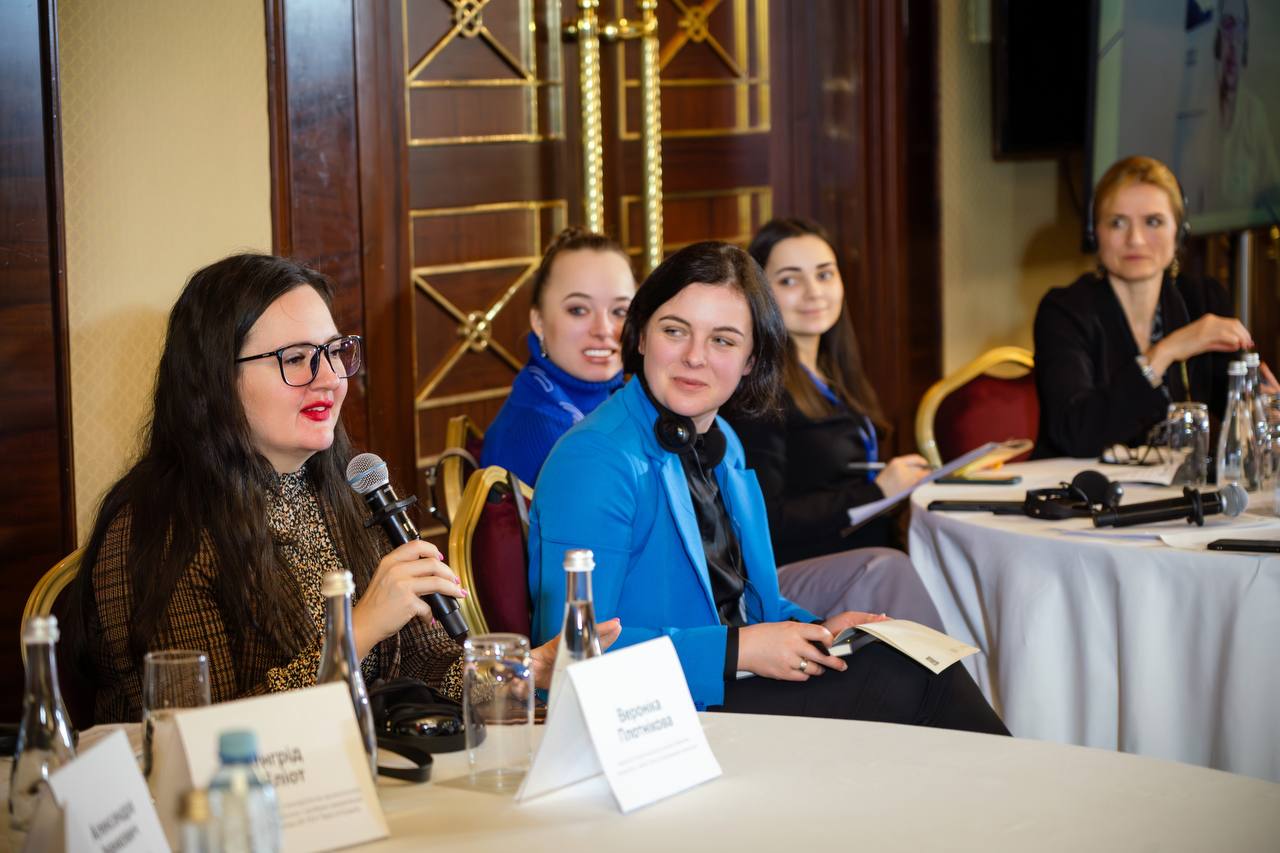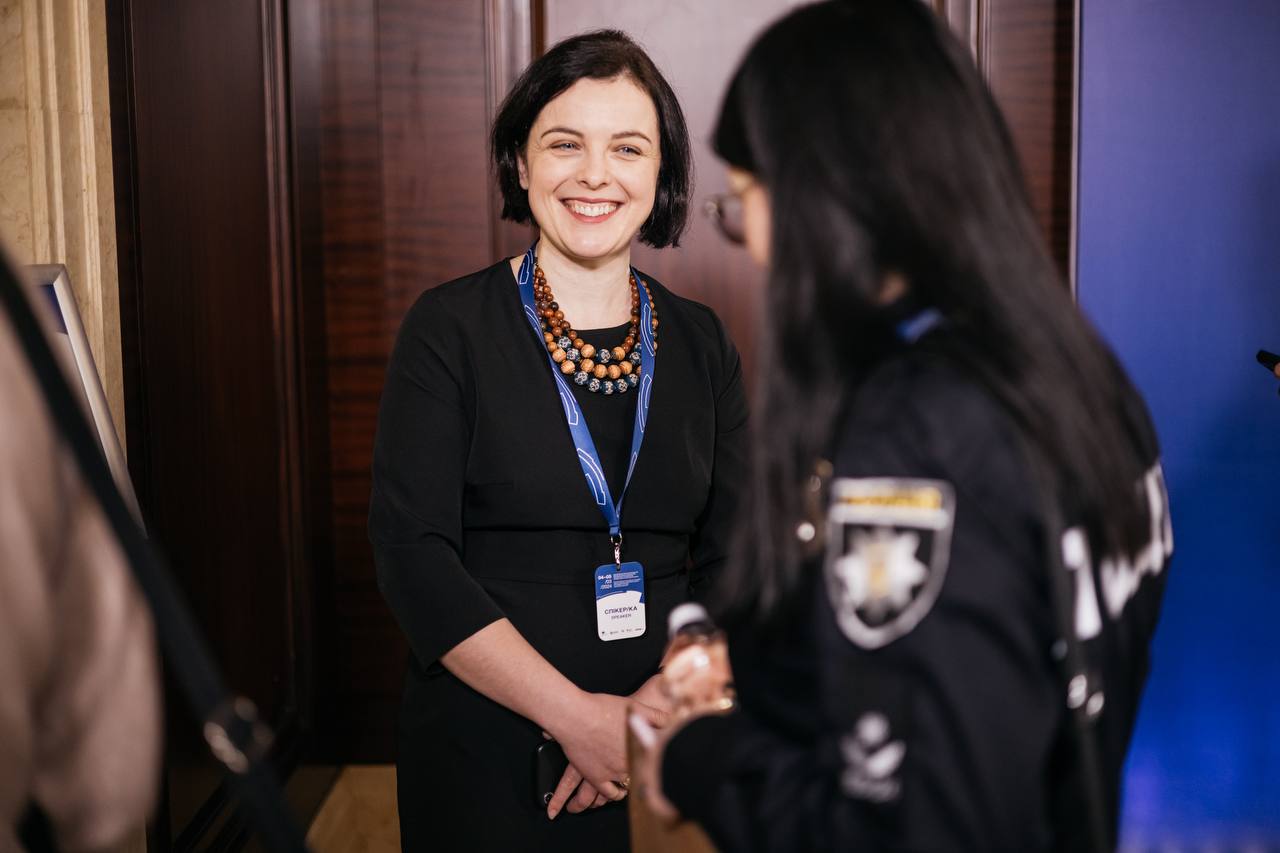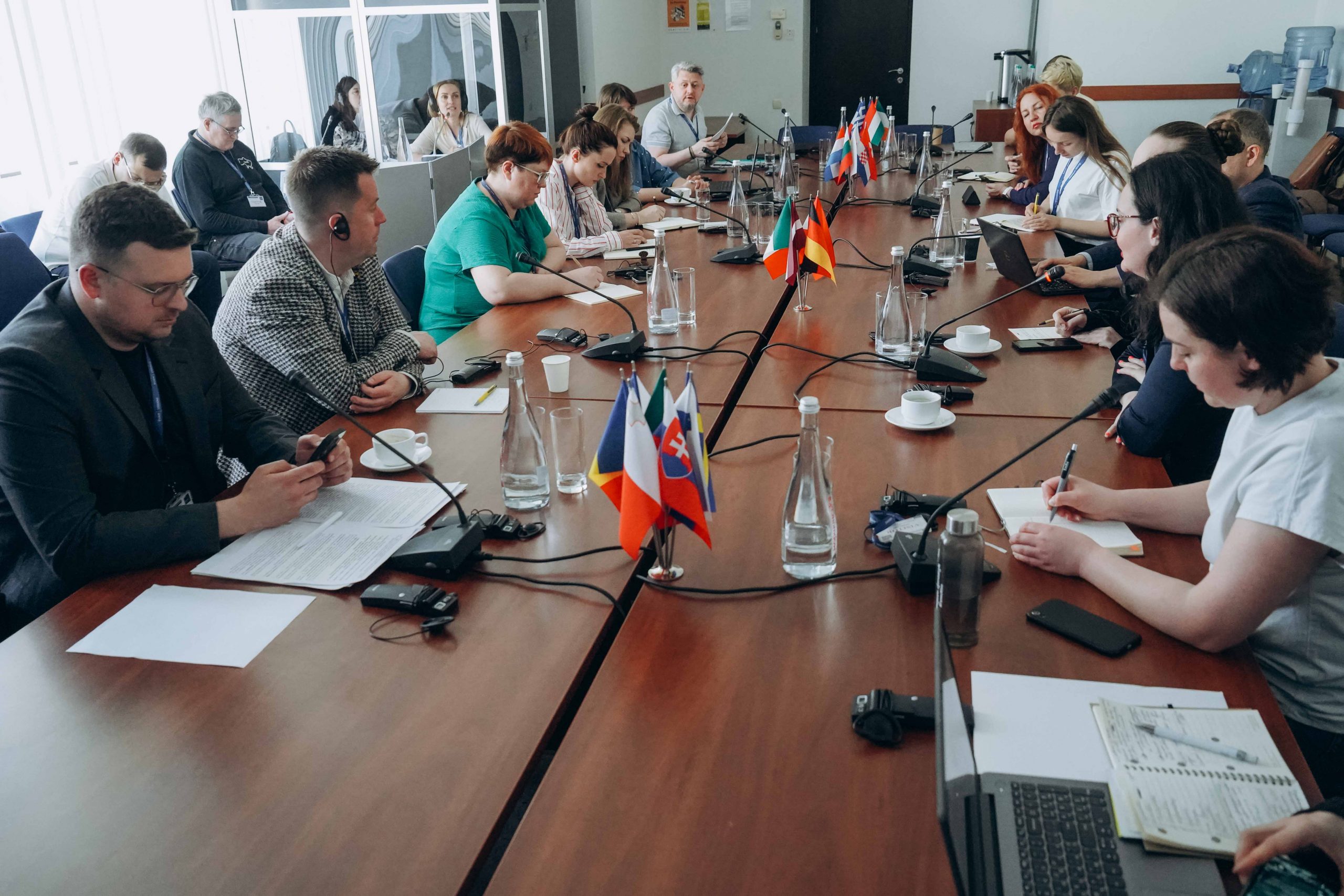Specialisation is critically important – investigators and prosecutors handling CRSV cases should not simultaneously deal with other categories of war crimes
June 10, 2025
For survivors of conflict-related sexual violence (CRSV), the road to justice is often long and difficult. It is essential that they are not left to walk it alone – that the justice system does not inflict further harm but instead provides support and helps restore dignity.
The European Union Advisory Mission (EUAM) Ukraine, together with its partners, is working to ensure that the justice system — from law enforcement to prosecutors and courts – is responsive to the needs of those who have lived through some of the most traumatic experiences imaginable.
Civil society organisations play a vital role in this work. Among them is the Ukrainian Women Lawyers’ Association “JurFem”, which actively promotes reforms aimed at protecting the rights of CRSV survivors and preventing re-traumatisation. In addition to documenting war crimes related to CRSV, the organisation provides comprehensive support to survivors and works to make access to justice both real and as trauma-informed as possible.
In May, EUAM and JurFem organised several key events – including a meeting of the CRSV expert group and a practical workshop on protecting survivors’ rights, as well as the international high-level conference “United for Justice. United for Survivors”. These events created space for open dialogue between representatives of public institutions, law enforcement, civil society, legal professionals, and survivors themselves. Participants were able to align their approaches, reflect on progress made, identify remaining challenges, and define ways forward.
We spoke to the head of the organisation, Khrystyna Kit, about what has already been achieved – and what still requires joint efforts.
Since the beginning of Russia’s full-scale invasion, what are the most urgent challenges faced by survivors and witnesses of CRSV when seeking justice through the legal system?
Engaging with the justice system is a significant challenge even for a person who has not experienced violence, not to mention for those who have survived sexual violence. This is because, firstly, one encounters procedures that are not always clear or understandable,and may not know what is happening or what the appropriate steps are in a given situation. Secondly, one has to recount the experience of sexual violence, which is a serious crime not only because it constitutes an international offense, but also because it involves an intrusion into one’s sexual autonomy and privacy. Recalling and speaking about such traumatic experiences is always difficult, especially when this has to be shared with law enforcement officers.
Thirdly, it is important to understand that, according to numerous studies analysing the needs of victims of gender-based crimes, the primary needs for such individuals are medical, psychological, and economic support. Only after receiving this support can a person be in a position to engage with the justice system.
For this reason, recognising these challenges and needs, the Office of the Prosecutor General established a Coordination Center for the Support of Witnesses and Victims, tasked with providing comprehensive support to survivors of CRSV within the framework of criminal proceedings.
Moreover, on November 11, 2024, the Council of Judges of Ukraine approved a Protocol for courts on working with vulnerable victims and witnesses. According to this protocol, support services for vulnerable victims and witnesses are to be established in four pilot courts. Comprehensive support is necessary not only during the criminal investigation stage but also during the court trial phase.
Secondary victimisation remains a serious issue during investigations and court proceedings. What specific safeguards are most relevant to ensure respectful treatment of survivors and to prevent re-traumatisation?
I will start with confidentiality, which is crucial for many survivors. Given the high level of stigmatisation and victim-blaming that exists in society, victims are often reluctant to report their experiences of sexual violence. Confidentiality is not only about the possibility of altering the personal data of a victim within the criminal proceedings; it also involves planning the investigation and communicating with the victim in such a way that no one else becomes aware of this communication.
For example, criminal procedural legislation allows for procedural interviews to be conducted outside police stations or prosecutor’s offices. When it comes to the court hearing and the need to ensure the participation of the victim, this can take place via videoconference. Moreover, if it is important for the victim in order to protect his/her privacy, the court hearing can be held in a closed session.
It is also worth highlighting the importance of video-recording the victim’s interview during the pre-trial investigation. This recording can then be used during the court proceedings, eliminating the need for the victim to be summoned for testimony in court, thereby reducing the risk of secondary traumatisation.

What changes have already been implemented in the Ukrainian justice system to support survivors of CRSV? Where do you see real, tangible progress?
It is important to highlight the specialisation of prosecutors and investigators who handle cases of conflict-related sexual violence. This specialisation helps to implement, as efficiently and promptly as possible, the strategic plan adopted by the Office of the Prosecutor General for exercising prosecutorial powers in response to CRSV.
In parallel, continuous training is provided to representatives of the criminal justice system on implementing victim-centred approaches in CRSV cases. Relevant training materials and guidance documents are also being developed and distributed.
Additionally, since 2022, survivors of CRSV have been granted access to the free legal aid system. This means they are entitled to both primary legal assistance and secondary legal aid, including legal representation by an attorney during pre-trial investigations and court proceedings.
Of course, the ratification of the Rome Statute and ongoing efforts to incorporate international standards into the investigation of criminal cases are also crucial milestones.
Equally important for achieving justice is the adoption in November 2024 of the Law of Ukraine “On the Status of Persons Affected by Sexual Violence Related to the Armed Aggression of the Russian Federation against Ukraine, and Urgent Interim Reparations” No. 4067-IX as of 20 November 2024. Implementation of this law will enable survivors to receive comprehensive and systemic assistance, which will also positively influence the identification and recognition of CRSV survivors.
You mentioned Law No. 4067-IX on interim reparations for victims of CRSV. Also the Verkhovna Rada is currently considering Draft Law No. 9351, which aims to improve procedures in CRSV-related cases. Why is its adoption important?

The Draft Law “On Amendments to the Criminal Procedure Code of Ukraine to Improve the Procedure for Conducting Pre-trial Investigation and Court Proceedings in Cases of Sexual Violence Committed in the Context of Armed Conflict” (No. 9351 dated June 5, 2023) was developed jointly with experts from the CRSV Expert Group of the Interagency Working Group on Investigating Crimes Committed in the Context of Armed Conflict, under the Office of the Prosecutor General.
It fully addresses the challenges faced by victims of CRSV and law enforcement agencies during the investigation and prosecution of such crimes.
In particular, the draft law aims to guarantee confidentiality for CRSV victims at all stages of the investigation and court proceedings.
The law proposes to ensure that motions and complaints during pre-trial investigations, as well as the court proceedings themselves, are handled in closed sessions, unless the victim submits a request for a public hearing.
Additionally, the official website of the Office of the Prosecutor General periodically publishes notices of suspicion issued against Russian military personnel who committed crimes, including information that may identify the victim, such as name, address, or other personal details. Currently, the redaction of such data is done manually and lacks legal regulation. Therefore, it is essential to stipulate that such notices be published without disclosing the first name, patronymic, surname of the victim, their close relatives or family members, or any other persons under protection, as well as their residence or location, the place where the crime occurred, or any information that could lead to the victim’s identification.
It is also crucial to allow victims to participate in court hearings remotely, outside the courtroom, using their own technical devices (as per Part 1, Article 336 of the Criminal Procedure Code of Ukraine). Furthermore, the law should establish a clear and limited list of individuals — namely, the judge, court usher, and court clerk — who may be informed of the identity of the victim or witness in cases involving sexual violence committed during armed conflict. This restriction is to prevent the dissemination of any information about the victim, unless a written motion from the victim leads the court to authorise an open hearing.
This draft law also reflects the requirements of the 2012 EU Directive on establishing minimum standards for the support of victims and witnesses in criminal proceedings, particularly in cases of gender-based violence. Therefore, its adoption is not only vital but also necessary in the context of Ukraine’s European integration commitments.
Beyond legislative changes, what deeper institutional reforms are needed to ensure that Ukraine’s response to CRSV cases fully aligns with international standards and genuinely addresses survivors’ needs?
Legislative changes alone are not sufficient to ensure the implementation of international standards and victim-centered approaches. Therefore, alongside legal reforms, it is essential to embed these approaches in practical work and direct interactions with people. This involves efforts at multiple levels, particularly within the education system and professional development of specialists.
We need to integrate into the curricula of law schools and training programs for security sector professionals topics related to international standards on victim-centered approaches, including the development of skills for effective communication and work with vulnerable witnesses and victims.
In addition, specialisation in cases of sexual violence and gender-based crimes is critically important. This means, for example, having investigators or prosecutors who specifically handle CRSV cases and do not simultaneously investigate other types of war crimes. Specialisation is equally important for lawyers within the free legal aid system, and it is vital to ensure that survivors of CRSV can access legal aid without excessive bureaucratic barriers.
Finally, systematic monitoring and evaluation of how professionals work with CRSV survivors is necessary. This monitoring should be continuous and regionally sensitive, as it is crucial to understand the situation in each area and respond appropriately to the specific challenges faced in different regions.
Civil society organisations like JurFem play an important role in shaping Ukraine’s response to CRSV cases. How does your organisation bridge the gap between survivors’ needs and the support currently available from the state?
We provide legal assistance to survivors of sexual violence. The process is very straightforward: someone calls us to request legal help, we assess the victim’s needs, assign a lawyer, and that lawyer works with the victim at various stages of the criminal proceedings or in court.
To involve one of our lawyers, no documents or certificates are required to prove that the person is a victim of sexual violence. It is enough for the person to state this, and then the lawyer, in consultation with the victim, determines a shared plan for further cooperation.
In addition, we work continuously with other civil society organizations that provide psychological, medical, or other forms of assistance to survivors of sexual violence. So, if a victim needs such support, we know where to refer them and how to help the person access the services they require.
From your experience, how effective is cooperation with EUAM in the area of CRSV-related reforms? In what ways could the Mission offer even greater support in the future?
We have been cooperating with EUAM for several years now. EUAM experts participate in our expert group on CRSV under the Office of the Prosecutor General. Their expert contribution to the development of draft laws, preparation of guidelines on investigating specific forms of CRSV, and similar initiatives is extremely valuable.
In addition, their work in advocating for change is important. Drafting a law, for instance, is only the beginning — what follows is the need to find various advocacy tools and explain why these changes matter. In this area, EUAM is an important and valuable partner.
Looking ahead, the Mission’s role in supporting the implementation of EU directives on victim-centered approaches is crucial, as Ukraine is still progressing along this path. There is a need to work not only on legislation but also on its local implementation.

What practical steps should be a priority for Ukraine and its international partners to ensure not only the current protection of CRSV survivors but also their long-term support?
The development and implementation of reparation mechanisms for CRSV survivors is a key part of ensuring justice and recovery. Currently, Ukraine has adopted the Law on the Legal and Social Protection of Persons Affected by Sexual Violence Related to the Armed Aggression of the Russian Federation against Ukraine and the Provision of Urgent Interim Reparations. Our joint task now is to ensure its effective implementation.
In addition, as of March 2025, CRSV survivors have obtained the right to submit claims to the Register of Damages for Ukraine. This means that international partners, together with Ukraine, must work to guarantee justice and compensation for all the harm caused by Russia.


